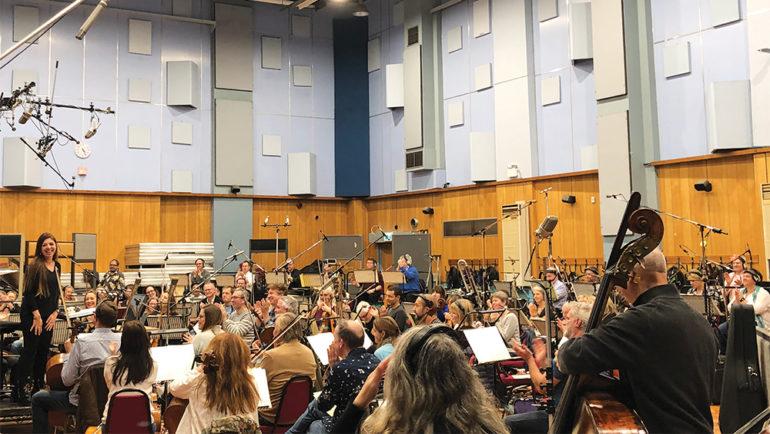Another Record for ‘Captain Marvel’: It’s the Top-Grossing Movie Scored by a Woman
By Jon Burlingame
LOS ANGELES (Variety.com) – Over a single opening weekend, composer Pinar Toprak smashed all previous box-office records for women composers in film. She scored “Captain Marvel,” which made $153 million domestically.
Until now, the top-grossing films by women composers were Rachel Portman’s “The Vow,” which made $125 million domestic in 2012, and Deborah Lurie’s “Dear John,” $80 million back in 2010 — and those sums were for the theatrical lifetime of the films, not just a weekend.
The lack of work for female composers has been a frequent topic of conversation in film-music circles since the 2014 formation of the Alliance for Women Film Composers, which now boasts more than 400 members.
According to the latest “Celluloid Ceiling” statistics from the Center for the Study of Women in Television and Film, just 6 percent of the 250 top-grossing films of 2018 had scores by women — but that number was double the 3 percent found in the list of 2017 films.
Last year’s 15-film Oscar shortlist was noticeably devoid of women composers, despite the high profile of such films as “The Wife” (scored by Jocelyn Pook) and “Eighth Grade” (Anna Meredith). In the past 20 years, women composers have been nominated for best score only three times (Portman, for “The Cider House Rules” and “Chocolat” in 1999 and 2000, and Mica Levi, for “Jackie” in 2016).
Will Toprak’s success with “” awaken filmmakers and studio executives to the notion of hiring more women? The answer appears to be a qualified “yes.”
Later this year, moviegoers will hear scores by Germaine Franco (“Dora the Explorer”), Hildur Guonadottir (“Joker”), Lesley Barber (“Late Night”), Mica Levi (“Monos”), Kathryn Bostic (“Clemency”), Tamar-kali (“The Last Thing He Wanted”), Heather McIntosh (“The Art of Self-Defense”) and more.
“A rise from 3 percent to 6 percent is good, but that shows we have a long road ahead of us,” says Lolita Ritmanis, who recently stepped down as president of the Alliance for Women Film Composers. She points out that the study does not include TV, streaming content, video games, independent films and other media and, “in those areas, the optics would indicate that the numbers are much higher than for the top-grossing films.”
Agents actively pitching women composers, studio music chiefs calling for more submissions from women, directors seeking diverse voices for projects — all these are reasons for optimism, Ritmanis (composer for TV’s “Young Justice”) adds. “Those voices have been there all along, but historically have been unjustifiably marginalized or compartmentalized.”
Barber, the composer of “Manchester by the Sea” and of this summer’s Emma Thompson-Mindy Kaling comedy-drama “Late Night,” puts it this way: “A couple of years ago, we might have said the conversation has started. Now it’s more like the conversation is changing.
“When women are given the opportunity and the access, they’re just knocking it out of the ballpark. If we look at the top-selling films coming out of Sundance in the last five years, there were women composers behind many of the top 10, if not top five. And I think those stories need to be told as well.”
Filmmakers, says Barber, “are looking for a composer that will bring great success to their film. So those who are given the opportunity and access and do well, are going to be asked to do more and more work. Filmmakers are looking for diversity because it’s really in their best interest. It brings fresh new voices and perspective to their films and to the musical language.”
Universal last year launched its Film Music Composer Initiative to promote diversity. Nora Kroll-Rosenbaum scored its DreamWorks Animation short “Bird Karma,” and its eight finalists in the latest Composer Initiative include four women.
Starr Parodi, the new president of the Alliance for Women Film Composers, concedes that women are still “very underrepresented” in the higher-profile and higher-paying feature-film arena but believes that “there is definite progress being made, especially in the amount of projects scored by women spanning all media.”
Parodi cites up-and-comers like Tamar-kali and Guonadottir as examples of “artists who are creating a unique cinematic sound… composers who are often sought out for the music they are already creating, to bring their sound to film.”
The AWFC president says her conversations with producers suggest that they are feeling pressure “to include more diverse voices in the mix of their productions, including those of female composers. I think studios and producers are realizing that new voices are not just a token, but are really needed to keep media content fresh, alive and relatable.”


